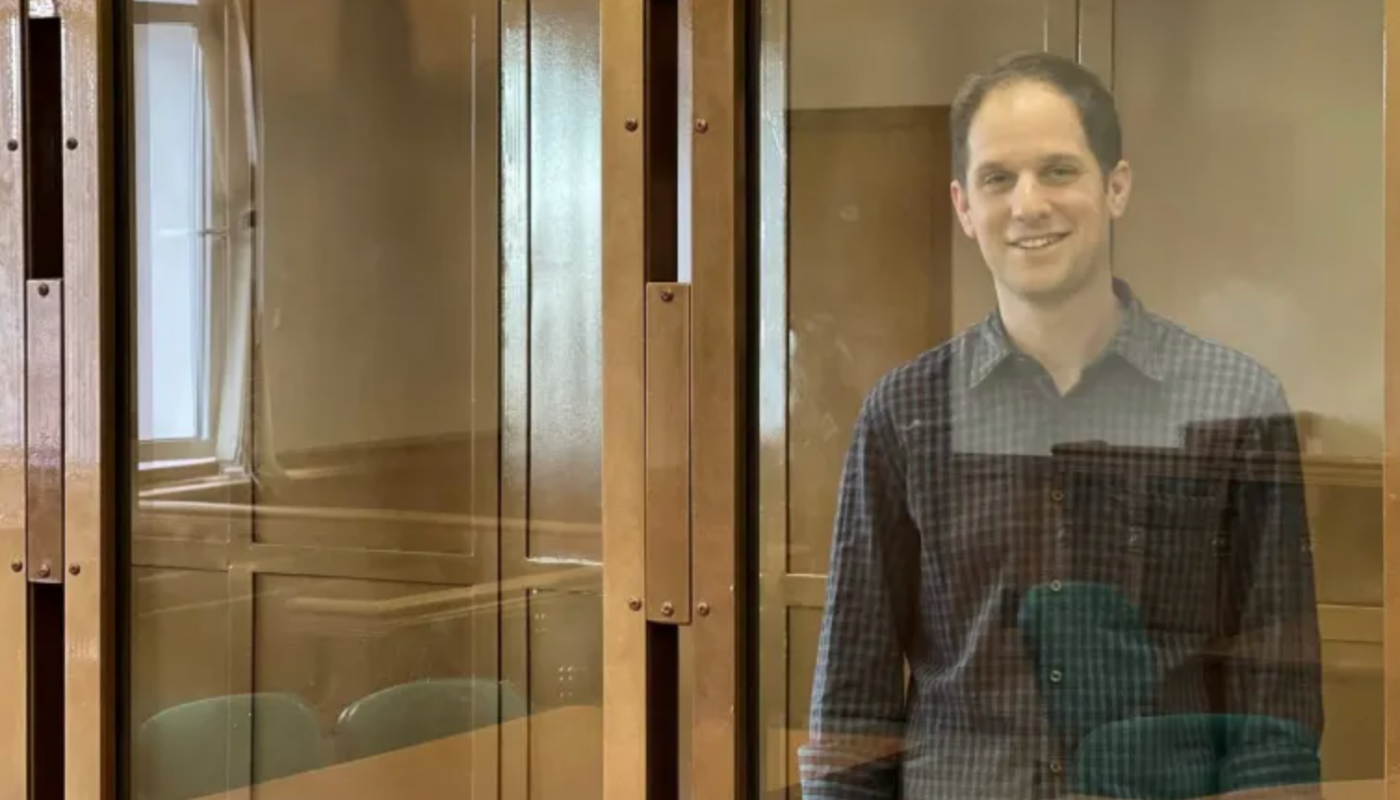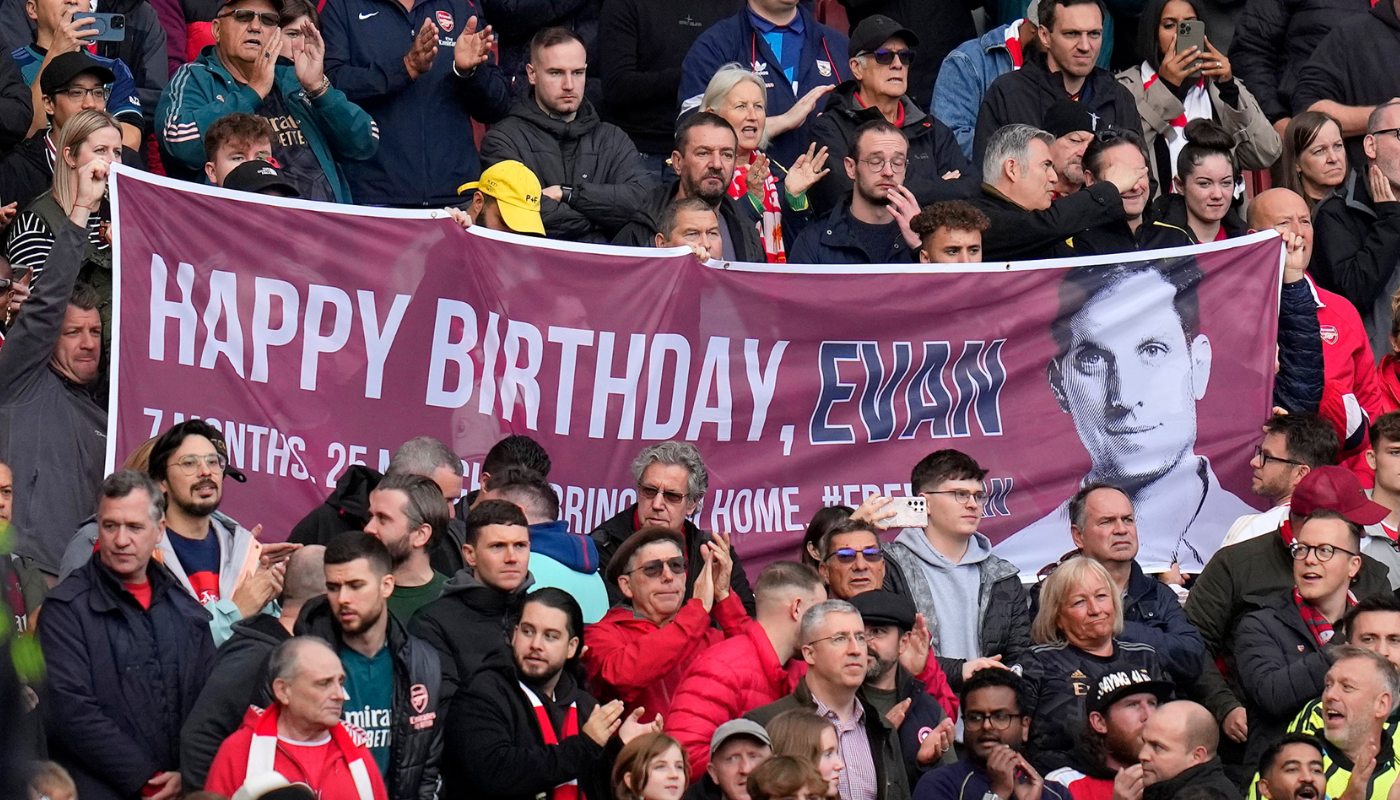Over the last year, those of you who follow me on Twitter might have spotted my posts about Evan Gershkovich, the American journalist detained by the Russian authorities on trumped-up charges of espionage.
I’ve never met Evan and I hadn’t paid more than a passing interest to the early headlines generated by his arrest until a mutual friend, Joe Parkinson, a colleague of his at the Wall Street Journal, messaged to tell me he was a big Arsenal fan.
“We were wondering if there were any tweets or contacts the Arsenal network might be able to help us with,” he wrote. “It’s crucial in these early days for people to see Evan as an ordinary guy, not just a reporter.”
The request, which included a snap of Evan wearing Puma’s terrible third kit from 2014/15, led to a Twitter thread that travelled far and wide thanks to the support of many of yours and my favourite Arsenal writers, reporters and podcasters.
It was a genuine source of pride the way the Gooner community rallied in support of one of its own.
You may have seen a story this week about a Wall Street Journal reporter arrested in Russia on espionage charges.
His name is Evan Gershkovich. He's 31. He grew up in New Jersey. He's a huge football fan.
And a massive Gooner.
(He's on the left wearing that terrible Puma kit) pic.twitter.com/FW8KLxUjI4
— Andrew Allen (@AAllenSport) April 2, 2023
Since then, I’ve followed the twists and turns of Evan’s situation closely. Global leaders have condemned his arrest, he’s been elevated to the front cover of Time Magazine, numerous journalistic awards have been bestowed upon him in absentia and he’s even had a message of support from Ray Parlour.
All the same, Evan, 32, remains behind bars in Moscow’s notorious Lefortovo prison, his pre-trial detention periodically extended by authorities who’ve not shared any evidence to support the charges he faces.
The son of Soviet-born immigrants who settled in New Jersey, Evan grew up fluent in Russian and had been covering the country for the Wall Street Journal for over a year. He was fully credentialled to do so and had built up an extensive body of work, building upon his experience working for the AFP news agency and the Moscow Times.
At the time of his arrest, exactly one year ago, Evan was in Yekaterinburg, 1,200 miles east of Moscow, reporting on the mercenary group Wagner. Despite the dangers, he’d taken it upon himself to provide desperately needed insights about Russia during its assault on Ukraine.

The first American journalist to be held in Russia since the Cold War, Evan is confined to his cell for 23 hours a day.
He has little human contact, is rarely afforded time to exercise and occupies himself reading and writing letters. Lately, he has taken to playing long-distance chess with his father. He is himself a pawn in a high-stakes geopolitical game and he knows his future lies in the hands of a vindictive, merciless and increasingly erratic Vladimir Putin.
Fresh from ‘winning’ another term in office, the Russian president finds his attention variously split between waging war on neighbouring Ukraine, stamping out political opposition and terrorist attacks on his doorstep. Getting him to pick up the phone is not easy.
While Putin has hinted at interest in a possible prisoner swap, back-channel negotiations are yet to produce results. The case of fellow American Paul Whelan, who was detained in 2018 on espionage charges and is now serving a 16-year jail sentence, underlines that there are no guarantees on that front.
One can only imagine how difficult the uncertainty is for Evan’s family. His parents, who fled the Soviet Union separately in 1979 before meeting in New York, have forged close ties with the White House and remain cautiously optimistic about his release.
“If you let the pessimism in, the game is over,” his mother Ella told ABC News this week.

On the eve of his arrest, Evan had messaged his friend Pjotr Sauer musing about Arsenal’s title chances and whether the return of Gabriel Jesus from knee surgery might make the difference. When Pjotr’s replies went unread, he knew something was amiss.
The two had met in 2018 while working at the Moscow Times and immediately bonded over their love of Arsenal and, in particular, Arsene Wenger’s playing philosophy and key trio Dennis Bergkamp, Thierry Henry and Patrick Vieira. He explains more in this interview with The Athletic’s Amy Lawrence.
While Arsenal were far from a vintage outfit when they struck up their friendship, the pair dutifully watched games together in the Russian capital until the Covid-19 pandemic sent them their separate ways.
After Evan’s arrest, it took months for communication between Evan and Pjotr to be restored. Now letters are traded back and forth from Lefortovo prison, the guards looking over the resumption of their Arsenal chats. Even though Evan’s world has been turned upside down, the Gunners remain at the forefront of his mind.
On Sundays and Mondays, he checks the results on Russian Match TV to see how Arteta’s side performed over the weekend. Without access to Premier League highlights, he lives the highs and lows thanks to Pjotr’s weekly translation of match reports and various columns from UK publications. Everything he receives is in Russian.
As it turns out, Russian state television does carry live coverage of the knockout stages of the Champions League. So in February, having gone 11 months without access to a glimpse of the team, Evan finally sat down to watch Arteta’s in-form side take on Porto. As you can imagine, he was less than impressed when they slipped to a stoppage-time defeat. What’s the Russian for sod’s law?
Thankfully, his mood was buoyed by the return leg. To paraphrase a line from his correspondence with Pjotr, David Raya’s heroics in the penalty shootout gifted him the happiest of Wednesday mornings. A rare high for a man living through a nightmare.
Those of you familiar with Aleksandr Solzhenitsyn’s “One Day in the Life of Ivan Denisovich” – set in a 1950s Soviet work camp – will be familiar with the psychological importance of small victories in a world where survival is everything.
“A day without a dark cloud. Almost a happy day,” reflects Shukov, the main protagonist, in the closing stages. I trust the Gunners can provide Evan with a few more of those while the world waits for his release.
On a most basic level, his plight reminds me how lucky I am to be able to watch matches in person alongside my friends and family. I hope I never take that for granted, even as the inevitable stresses and strains of the next couple of months reach fever pitch.
I don’t know what’s going to happen next for Evan or Arsenal, but I’ll be keeping my fingers crossed for both.
#ISTANDWITHEVAN
__
To learn more about the campaign to #FreeEvan and to send him a message, visit www.freegershkovich.com & The Wall Street Journal
Evan Gershkovich is confined to a cell 23 hours a day, in a Russian prison 4,700 miles from home—for doing nothing more than his job #IStandWithEvan pic.twitter.com/7jV8LlX7Lz
— The Wall Street Journal (@WSJ) March 27, 2024


